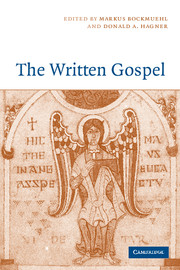Book contents
- Frontmatter
- Contents
- List of contributors
- List of abbreviations
- Introduction
- PART I BEFORE WRITING
- PART II WRITING THE FOUR GOSPELS
- PART III AFTER WRITING
- 11 The Four among Jews
- 12 The Four among pagans
- 13 Forty other gospels
- 14 The One, the Four and the many
- 15 The making of gospel commentaries
- Appendix: Graham Stanton's publications
- Bibliography
- Index of ancient sources
- Index of authors
13 - Forty other gospels
Published online by Cambridge University Press: 07 December 2009
- Frontmatter
- Contents
- List of contributors
- List of abbreviations
- Introduction
- PART I BEFORE WRITING
- PART II WRITING THE FOUR GOSPELS
- PART III AFTER WRITING
- 11 The Four among Jews
- 12 The Four among pagans
- 13 Forty other gospels
- 14 The One, the Four and the many
- 15 The making of gospel commentaries
- Appendix: Graham Stanton's publications
- Bibliography
- Index of ancient sources
- Index of authors
Summary
The four gospels in the NT have always received special attention, partly by virtue of being canonized as part of Christian scripture. Yet it is clear that these four are part of a much wider corpus of texts, either claiming the name of ‘gospel’ for themselves or being described by others (past or present) as ‘gospels’. It is with these ‘other’ gospels, i.e. gospels other than the canonical gospels of the NT, that this essay is concerned.
These ‘other’ gospels vary very considerably in scope, content and (probably) genre. The question ‘What is a gospel?’ is well known as a problem which is by no means simple when applied to the canonical gospels of the NT (cf. Talbert 1977; Burridge 1992). The same question applied to the mass of other writings which have at various times been called ‘gospels’ is infinitely more complex to try to answer: these writings vary so much that it is hard, if not impossible, to find common denominators in all of them.
MANUSCRIPT EVIDENCE
Such variation applies even at the mundane level of our knowledge of their text, their extent etc. In the case of the canonical gospels, the huge range of MSS available to us for all four of these gospels means that the broad contours of both their extent and their content are not generally in doubt. The situation is very different in relation to the non-canonical gospels.
- Type
- Chapter
- Information
- The Written Gospel , pp. 238 - 253Publisher: Cambridge University PressPrint publication year: 2005



